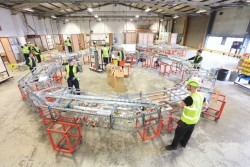Leading national engineering specialist, SES Engineering Services (SES), is relocating its award-winning offsite manufacturing facility, Prism, to a new 68,000 sq ft facility in Coventry.
The relocation and expansion of its flagship Prism facility from York follows a period of strong growth for the business in providing prefabricated mechanical and electrical (M&E) works to some of the UK's largest and most complex buildings including the development of the state-of-the-art aseptic manufacturing facility for global pharmaceutical company, GSK.
Prism in Coventry will manufacture and assemble M&E products including 2D & 3D multi-service modules, plant skids, multi-service risers and sectional plantrooms. Using offsite manufacturing techniques saves thousands of man hours, improves health and safety, enhances quality, and increases efficiency on major projects, particularly those delivered in built-up and logistically challenging environments.
The £180m turnover specialist contractor has a successful pedigree in the use of offsite manufacturing and recently won the award for "Best Use of MEP & Pod Technology" at the Offsite Awards for the fourth consecutive year.
Jason Knights, Managing Director, SES Engineering Services, said: "Our Prism arm has been a real growth driver for our business, with clients keen to take advantage of offsite capabilities to speed up delivery of their projects. This expansion reflects the industry shift towards prefabrication, as well as the success of SES as a whole."
Lewis Jones, General Manager, Prism Offsite Manufacturing, said: "We're incredibly proud of SES' long and established history in producing innovative MEP offsite solutions in our Prism factory and the engineering heritage we offer - including the availability of high quality, skilled people in Coventry who will help take our growth and delivery to the next level.
"This is particularly important as the demand for offsite solutions on MEP projects continues to rise across the country, which is why we are focused on improving efficiencies that will continue to benefit the construction industry as a whole."
"By using BIM and prefabrication, we can drastically improve project efficiency, working with the main contractors to co-ordinate on design and detect issues at an early stage, requiring fewer redraws, snags and defects on site."









